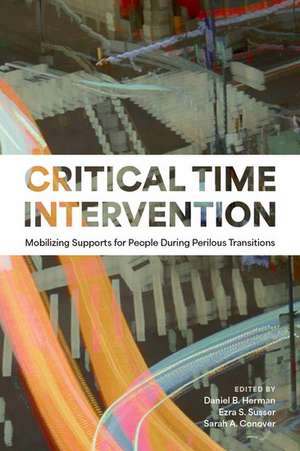Critical Time Intervention: Mobilizing Supports for People During Perilous Transitions
Editat de Daniel B. Herman, Ezra S. Susser, Sarah A. Conoveren Limba Engleză Hardback – 19 dec 2024
Preț: 369.17 lei
Preț vechi: 509.78 lei
-28% Nou
Puncte Express: 554
Preț estimativ în valută:
70.65€ • 73.34$ • 58.91£
70.65€ • 73.34$ • 58.91£
Carte disponibilă
Livrare economică 21-27 februarie
Preluare comenzi: 021 569.72.76
Specificații
ISBN-13: 9780197518113
ISBN-10: 0197518117
Pagini: 200
Dimensiuni: 163 x 239 x 28 mm
Greutate: 0.41 kg
Editura: Oxford University Press
Colecția OUP USA
Locul publicării:New York, United States
ISBN-10: 0197518117
Pagini: 200
Dimensiuni: 163 x 239 x 28 mm
Greutate: 0.41 kg
Editura: Oxford University Press
Colecția OUP USA
Locul publicării:New York, United States
Notă biografică
Daniel Herman is Professor Emeritus and former Associate Dean for Research at the Hunter College Silberman School of Social Work and the Graduate Center of the City University of New York. He previously served on the faculty of Columbia University's Mailman School of Public Health and its Department of Psychiatry. Dr. Herman is the founding director of the Center for the Advancement of Critical Time Intervention which promotes international dissemination of the CTI model. He began his academic career following a dozen years working as a social worker in New York City's public mental health and homeless services systems. Ezra S. Susser is Professor of Epidemiology and Psychiatry at the Mailman School of Public Health at Columbia University, and at New York State Psychiatric Institute. At Columbia University, his roles have included Chair of Epidemiology, Director of the Psychiatric Epidemiology Training Program, and co-founder of the Columbia University Global Mental Health Program.His work includes the initial development and testing of Critical Time Intervention (CTI) to prevent recurrent homelessness, and its adaptation to settings in Latin America, alongside Sarah A. Conover. Under the leadership of Daniel Herman, as well as Sarah A. Conover, he has contributed to the ongoing evolution of CTI in the Center for Advancement of CTI. Sarah A. Conover directs the Global Network of the Center for the Advancement of Critical Time Intervention at Hunter College, which promotes fidelity to the model through collaboration on international adaptations. She co-developed the CTI model while at the New York State Psychiatric Institute, where her focus was on developing and evaluating services for people with schizophrenia who are homeless.
